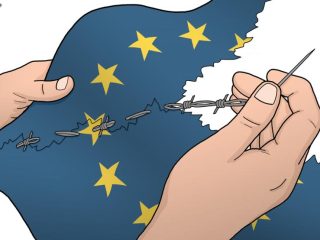Binkley and I speculated from the beginning that the “true meaning of Trump” might be to spark a globalist backlash, for example in Episode 24 of the Propaganda Report from January 26, only a few days after the inauguration. We specifically, repeatedly discussed the impact this all would have in Europe as the reality of “the Nazi next door” sparked ingrained fears. Well, in yesterday’s Wall Street Journal, we are told that’s exactly what happened…
European Populists Who Aped Brexit and Trump Rethink Their Approach
Many officials think their attempt to associate with the U.K. and the U.S. undermined what was supposed to be a banner year
CARPENTRAS, France—Europe’s populist politicians hoped this would be the year they rocked the Continent’s establishment. Instead, their assault on the European Union has brought election defeats, recriminations and self-doubt….
Many of Europe’s far-right politicians now believe their attempt to associate themselves with the antiestablishment uprisings behind the U.K.’s vote to leave the EU and Donald Trump’s U.S. presidential victory has backfired….
Continental European voters, although hardly content with incumbents or the EU, viewed electoral shocks in the U.K. and U.S. as destabilizing….
Anti-EU nationalists “were so electrified after Brexit and Trump that they thought all of us would be president or prime minister of their country,” says Gerolf Annemans, a leading figure in Belgium’s Flemish-nationalist party and in a group of EU-skeptic parties in the European Parliament. Instead, he says, “to some extent the Trump election has frightened off parts of the center electorate in Europe.”…
[M]any European voters were unsettled by what was happening in the U.K. and U.S. The U.K. has struggled to figure out how to disentangle itself from the EU. Germans’ trust in the U.S. fell from 59% in Nov. 2016 to 21% in February, and has remained at low levels, according to opinion polls commissioned by public broadcaster ARD.
Support for the EU, battered by long crises over debt and migration, began to recover. The EU’s own latest Eurobarometer report on public opinion, published in August, found that trust in the EU has risen to 42%, from 36% a year ago and 32% in late 2015….
Peter Appelt, a 57-year-old worker in a train factory who lives in Germany’s east, told The Wall Street Journal last year he supported the anti-immigration AfD party because Europe “doesn’t work,” and because he was fearful of the large influx of immigrants. “The other parties need to be taught a lesson,” he said then.
Now, he says he has changed his mind. He doesn’t know yet who he will vote for in Germany’s Sept. 24 parliamentary elections, he says, but it won’t be the AfD. He says he finds the party too amateurish and extreme, and that watching events in the U.S. and U.K. has made him more skeptical.
He sees the AfD’s policies as similar to Mr. Trump’s. “He wants to wall off his country, and the AfD also wants to keep all foreigners from entering, and that doesn’t work either,” he says. Mr. Trump’s political struggles and the U.K. difficulties defining its future relationship with Europe have convinced him that isolationism makes for bad policy, he says. “In a globalized world, one can’t act like a small island,” he says.
Alexander Gauland, who co-heads the AfD ticket for the September election, says…if Mr. Trump had managed to start construction on his promised Mexican-border wall, the AfD could have used the new president’s success to trumpet the feasibility of its own demands to close Germany’s borders.
“Now that it’s become tangled up in details, people are no longer paying attention,” Mr. Gauland says.
In short, according to the Journal, Trump is seen as destabilizing and ineffective and the European Union, whose popularity was waning in the wake of their debt crisis, is rebounding: It seems that globalism is the answer after all.


Reblogged this on .